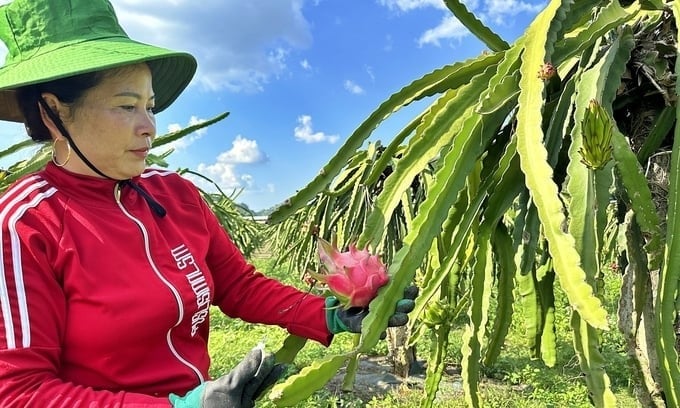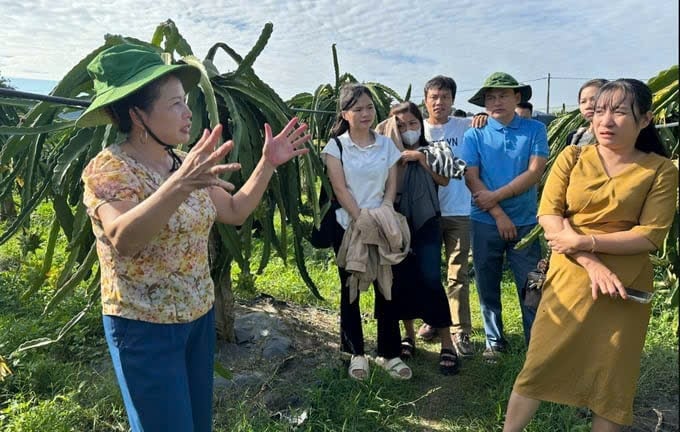May 29, 2025 | 09:41 GMT +7
May 29, 2025 | 09:41 GMT +7
Hotline: 0913.378.918
May 29, 2025 | 09:41 GMT +7
Hotline: 0913.378.918

Ms. Dung personally hand-pollinates off-season dragon fruit buds to stimulate flowering. Photo: Duc Binh.
Ngoc Hoang Cooperative – formerly, local farmers mainly cultivated crops such as corn, beans, and peanuts. However, these crops yielded low income. At that time, the cooperative had not yet been established. Mr. Nguyen Quang Vinh (now the Director of the Cooperative) received support from the Fruit and Vegetable Research Institute, which introduced red-fleshed dragon fruit varieties and brought them to Son La for trial planting.
After successfully growing the crop, Mr. Vinh shared his experience and guided surrounding households on cultivating and expanding dragon fruit farming.
On March 18, 2016, Ngoc Hoang Cooperative was officially established with 11 pioneering members, most of whom had followed Mr. Vinh in growing dragon fruit. During the cultivation process, we realized that dragon fruit brought high economic returns. However, since dragon fruit had not yet been recognized as a key crop of the province at the time, its development faced many challenges.
We boldly proposed to the provincial leadership that dragon fruit be included in the list of key crops. Since then, with the close attention and direction from the province, we have received support from various departments, sectors, and local leaders.
Relevant units came directly to the area, worked alongside local farmers to sell products, understood the living conditions, and assisted with trade promotion, helping us advertise our products. The role of the press and media in promoting Son La dragon fruit has also been very important. Thanks to these efforts, our dragon fruit products have reached many other provinces and cities.
In the past, we were very worried because we didn’t know how to sell our products. However, thanks to trade promotion activities, traders and customers from various regions are now aware of and come to purchase Son La dragon fruit. The reason is that Son La dragon fruit is of high quality due to the region’s unique soil and climate conditions, especially the temperature difference between day and night.

Many delegations have visited to learn from the Ngoc Hoang Cooperative model. Photo: Duc Binh.
Additionally, the people of Son La are renowned for their diligence and eagerness to learn. They actively seek knowledge not only through the media but also from books and training courses. This helps us effectively apply scientific and technical advances in agricultural production. Notably, today, not only dragon fruit but also many other types of fruit in Son La can be grown off-season. In the past, dragon fruit was not available during the Lunar New Year holiday, but now it is present, serving both the people of Son La and those in other provinces.
We have explored and learned how to control the flowering time to ensure both the yield and quality of the fruit, meeting export standards. Since 2017, we have oriented our production towards organic practices, strictly managing inputs and outputs, and planning cultivation zones. We have also proactively connected with businesses to promote and distribute our products.
Son La is likened to the "giant air conditioner" of the Northwest, with its many microclimates, a temperature difference of 4–5 degrees Celsius between day and night, and mountainous terrain — all of which create ideal conditions for dragon fruit cultivation. Taking advantage of these natural conditions, Ngoc Hoang Cooperative now produces high-quality dragon fruit that meets the requirements for export to the EU market.
For export, the inspection process is very strict. Many delegations from abroad visit Vietnam to collect soil and water samples for testing, maintain production logs, monitor the frequency of organic pesticide applications, and oversee care procedures. After harvesting, the cooperative must send 6 to 8 samples to Ho Chi Minh City for further testing. Only when all requirements are met can the products be exported.
By 2018, our dragon fruit products began to be exported to markets such as France, Russia, Japan, and Italy. However, the cooperative has not yet been able to export directly and still must go through intermediaries. Nevertheless, the product quality has been highly appreciated by customers, and orders have been increasing steadily.
In 2024, due to unfavorable weather conditions, export volume reached only about 800 tons. But in 2025, after improved inspection and control of the cultivation areas, we estimate export volume could reach approximately 1,600 tons. Many businesses have already signed contracts to secure product purchases. However, we still face challenges from harsh climate conditions, with prolonged droughts lasting 7 to 8 months causing significant damage to the crops.
Despite this, dragon fruit is a drought-resistant crop and still provides stable income. To ensure a consistent output, we have advised members to proactively identify water sources and apply reasonable irrigation methods to guarantee quality and quantity that meet the export requirements for 2025.
Translated by Phuong Linh

(VAN) Bamboo products from Thang Tho Bamboo Cooperative have reached many countries around the world, while also creating jobs for local workers.

(VAN) The Management Board of Con Dao National Park reported that a green sea turtle, tagged in the Philippines, has traveled thousands of kilometers to lay 84 eggs on Bay Canh Islet.

(VAN) Green technology is paving a new path for sustainable aquaculture in the Mekong Delta in particular and across the country in general, helping reduce emissions and adapt to climate change.

(VAN) On May 27, La French Tech Vietnam (the French startup and innovation community in Vietnam) held the French Tech Summit Vietnam 2025.
/2025/05/27/4731-2-223159_980.jpg)
(VAN) No votive paper, no styrofoam, no plastic bags, no plastic bottles, and no single-use plastic trays are the key rules tourists should keep in mind when visiting Con Dao.

(VAN) In the fight against plastic pollution, Vietnam has been demonstrating a proactive, pioneering, and active role in addressing the greatest environmental challenge today.